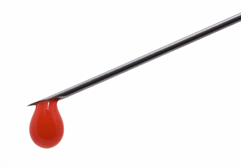 NeedleSmart claims that it is helping to reduce clinical waste in the UK.
NeedleSmart claims that it is helping to reduce clinical waste in the UK.
“According to a statement, British smart MedTech company, NeedleSmart, is at the forefront of helping the British National Health Service (NHS) radically reduce CO2 emissions in its clinical waste disposal by a staggering 95 per cent as part of its Carbon Reduction Strategy, saving £10s of millions in clinical waste destruction.
Reducing CO2 emissions
To illustrate the possible impact of the use of NeedleSmart technology in the reduction of CO2 emissions, it was reported that if it had been used in the global COVID-19 vaccinations programme to deliver the 134 million vaccinations in the United Kingdom, the NeedleSmart technology would have saved the NHS 15,132 tonnes of CO2 annually, purely in relation to the vaccination programme.
This is equivalent to:
- 15,000 flights from London to New York
- 66 million miles in a family car
- 45,000 square metres of polar ice caps melting
- 39,600 trees storing atmospheric CO2 each year
Destruction of hypodermic needles
According to the press release, NeedleSmart’s award-winning NeedleSmart PRO (NS Pro) needle destruction device has achieved FDA approval as a Class II medical device, being the first UK company to achieve FDA 510(k) approval (Class II for Sharps Needle Destruction.
Reduction in clinical waste
NeedleSmart’s innovative technology also offers the opportunity to move hypodermic needles, syringes and consumables associated with the injection/vaccination process, away from conventional sharps bins to a solution that allows recycling to become a possibility.
For example, by using the NeedleSmart device to compress needles, there could be a significant reduction in the needle footprint leading to a minimum of 50% increase in needle count per sharps bin.
Recycling
The use of the NeedleSmart technology also offers opportunities for recycling. This is because, previously, the entire needle would have had to be disposed into a plastic sharps box, but now, the clinical waste can be split into two parts, with the molten metal ball part of the clinical waste recycled as safe waste and the plastics recycled into the system. This represents a huge advancement for the NHS – which is one of the UK’s biggest producers of carbon – in reducing its carbon emissions and recycling its clinical waste.
Cutting costs
Commenting on the NeedleSmart technology, CEO and smart MedTech disruptor, Cliff Kirby said that “by adopting the NS PRO device, the NHS will enjoy a whole host of efficiencies in cost-savings and reduction in carbon emissions, in addition to crucial safety aspects.”
Regarding this, the NS PRO device can help the NHS save money and cut costs in a number of ways, including helping to reduce and eradicate the 100,000 needlestick injuries that occur every year that cost each NHS trust £500,000 each year and an estimated £127 million across England.
NeedleSmart also aims to offer the use of a 96 per cent recycled cardboard clinical waste box (when NS PRO is used) as a viable alternative to the current single-use sharps bins.
Lastly, the UK government plans to add a plastic tax of 20 per cent per tonne on single-use plastic packaging as of April this year, meaning the NS PRO and its clinical waste box presents a real reduction opportunity in this tax levy to the NHS.”
This remarkably bold flimflam appears in several trade newspapers and the like, so I think we can believe beyond doubt that it stems from a press release directly from the company and that it is intended, by any means possible, to promote sales.
Perhaps the company would go as far as presenting some evidence to support their claims. I doubt it.
The fraction of any needle/syringe assembly that is treated in the NeedleSmart device will make some, but a much smaller contribution to total waste volumes that the company’s words are intended to portray.
Next, the reductions in CO2 emissions need reliable evidence. As presented, I really doubt the credibility of their data. It simply doesn’t add up.
Another eye catching claim is that their device will eradicate the 100,000 needlestick injuries that occur every year that cost each NHS trust £500,000 each year and an estimated £127 million across England. That is 274 sharps injuries per DAY in England. Once again, where is the evidence sine, as presented, I really doubt the credibility of their data. It simply doesn’t add up.
If potential customers are tempted to go down this route, I do hope that they think long and hard about the claims and take action to compensate for what I expect to be the inevitability that the magical numbers that the company choose to put out fail to materialise.
Time will tell. In the meantime, tread carefully, very carefully. And of course be careful when handling, using, and disposing of sharps. That said, I do hope that the company can present their evidence. If the product does possibly come anywhere the claims made for it, I will be both surprised and delighted.

